Studying International Relations. Switzerland. Majoring in Political Sciences with a minor in International Law. Motivational blog.
Don't wanna be here? Send us removal request.
Text
german verbs
these are the 100 most common verbs in the german language according to A Frequency Dictionary of German sorted alphabetically. if you find a mistake anywhere/something’s unclear, please let me know!
anbieten - to offer
anfangen - to begin
ansehen - to look at, watch
arbeiten - to work
aussehen to appear, look
bedeuten - to mean
beginnen - to begin
bekommen - to get, receive
bestehen - to consist (of); to pass (an exam)
betreffen - to concern
bieten - to offer
bilden - to form; educate
bleiben - to stay, remain
brauchen - to need
bringen - to bring, take
darstellen - to depict, portray
denken - to think
dürfen - to be allowed
entsprechen - to correspond
entstehen - to originate, develop
entwickeln - to develop
ergeben - to result in
erhalten - to receive
erinnern - to remember
erkennen - to recognize
erklären - to explain
erreichen - to achieve, reach
erscheinen - to appear
erwarten - to expect
erzählen - to narrate, tell
fahren - to drive, ride
fallen - to fall
fehlen - to lack, be missing
finden - to find
folgen - to follow
fragen - to ask
fühlen - to feel
führen - to lead
geben - to give
gehen - to go
gehören - to belong
gelten - to count, be valid
gewinnen - to win
glauben - to believe
haben - to have
halten - to hold
handeln - to deal, trade
heißen - to be called
helfen - to help
interessieren - to interest
kennen - to know
kommen - to come
können - to be able
lassen - to let, allow
laufen - to run
leben - to live
legen - to lay, put (down)
lernen - to learn
lesen - to read
liegen - to lie
machen - to do, make
meinen - to think, have an opinion
mögen - to like
müssen - must, to have to
nehmen - to take
nennen - to name, to call (a name)
reden - to talk
sagen - to say
schaffen - to create; to succeed
scheinen - to shine; to seem, appear
schließen - to close
schreiben - to write
sehen - to see
sein - to be
setzen - to set, place
sitzen - to sit
sollen - should
spielen - to play
sprechen - to speak
stehen - to stand
stellen - to place, set
studieren - to study (in university)
suchen - to search, look for
tragen - to carry, wear
treffen - to meet
tun - to do
verbinden - to connect, link
vergehen - to elapse; to decay
vergleichen - to compare
verlieren - to lose
verstehen - to understand
versuchen - to try, attempt
vorstellen - to introduce; to imagine
warten - to wait
werden - to become
wissen - to know
wohnen - to live
wollen - to want
zeigen - to show
ziehen - to pull
1K notes
·
View notes
Text
German Masterpost
Learning a language is much easier if you actually use the language, get to know the culture better and do stuff on your own. My own experience is that I learned English at school, but then I started to watch a lot of stuff on YouTube, watch as many movies as possible in English and read in English and became top of the class.
This masterposts consists of my favorite German things. I added some more stuff, so not all of this is what I am usually interested in, but they are mainstream and classics that everyone knows.
I’ve always wanted to do a masterpost of german stuff I would recommend to those who want to learn German or more about the german language :)
So, stay tuned for my personal recommendations! (links are bold)
Listening
Radio:
N-JOY (northern Germany)
1LIVE (Northrhine-Westphalia) (these two are only the hitradio stations, for younger people. If you want something else, look through the different stations of the WDR and the NDR)
DASDING.de (the livestream is easy to find)
SWR3
MDR Sputnik
Kiraka (for the kids)
Podcasts:
Ohrenbär: stories for children
Sanft & Sorgfältig (cancelled, but you can still listen to every episode): the hosts, musician Olli Schulz and comedian Jan Böhmermann discuss lots of different topics (they are funny and down to earth, but speak very fast, so this one is nothing for beginners)
German music:
Pop/Rock: Sarah Connor (Album: Muttersprache) Andreas Bourani Silbermond Olli Schulz AnnenMayKantereit Spotify Deutschpop playlist
Rap/Hip Hop: Alligatoah Namika Kollegah K.I.Z. Karate Andi Genetikk Cro Dendemann German Rap Playlist 1 German Rap Playlist 2 History of German Rap
Reading
Frankfurter Allgemeine Zeitung (FAZ) (really a lot of coverage of diverse topics)
taz.die tageszeitung (more progressive)
Die ZEIT (really huge tbh, but interesting stuff about so many topics)
Spiegel Online (one of germany’s most famous news magazins)
Die Welt (more conservative)
BILD.de (boulevard press, but the language is easy and the articles aren’t too long I guess)
BuzzFeed Deutschland
Watching
News
tagesschau tagesthemen (ARD)
ZDF heute ZDF heute-journal
TV shows
Die Sendung mit der Maus (For children. Information and entertainment. It’s a classic and pretty much everyone’s childhood)
Wissen macht Ah! (For 9-12 year olds whose childhood was Die Sendung mit der Maus and who are not ashamed. I used to love this show.)
Tatort (a crime series, THE german classic. Every bigger german city has its own team. I personally recommend Münster)
heute-show (Satire in the style of a News TV show with an audience. Inspired by the Daily Show. Hosted by Oliver Welke, starring many other German comedians, check them out if you like them. 10/10 would recommend.)
PussyTerrorTV (Cabaret by Carolin Kebekus. Not the most famous thing but I love it and she deserves to be on this.)
NEO MAGAZIN ROYALE (Late night. Hosted by Jan Böhmermann. For younger people, as I said he speaks very fast. Don’t watch this if you don’t understand satire. Also featuring Dendemann from earlier on this list. Listed because it’s one of my favorites. If you want to get to know the style of the show, some of the songs are in English (x) (x) (x))
I would love to show you Circus Halligalli, it’s one of the best things on german television and very funny, but its rights belong to ProSieben, a private TV station, which means you cannot watch it online. But here is what came before: NeoParadise (late night and comedy, starring Joko Winterscheidt and Klaas Heufer-Umlauf)
(yeah, the only stuff I watch on TV is news and comedy.)
YouTube
Rocket Beans TV they someohow brilliantly manage to blend the lines between TV and vlogging which is really cool, check them out!
SPACE FROGS / SPACE RADIO two guys from Berlin. Comedy, commentary on different topics, cooking, gaming and much more.
theclavinover synchro, music, comedy and more
Sarazar gaming
Joyce Ilg a nice vlogger
LeFloid news coverage and commentary, talks VERY fast
Please contact me if one of the links doesn’t work!
3K notes
·
View notes
Photo

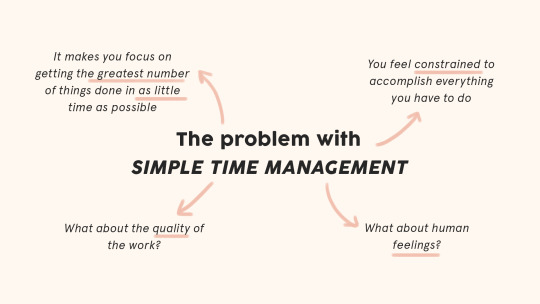

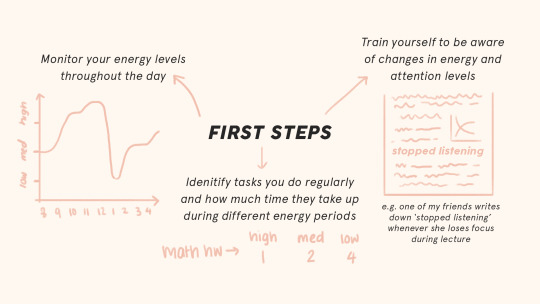

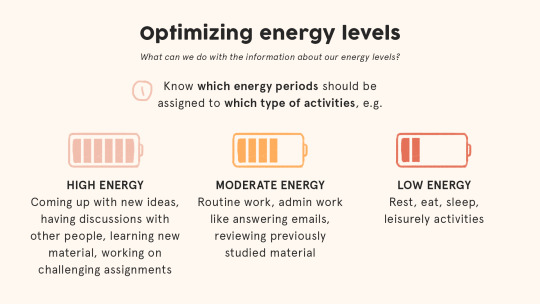
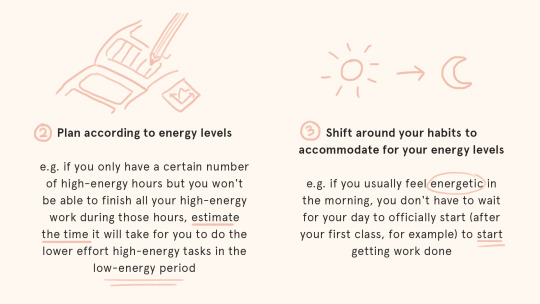
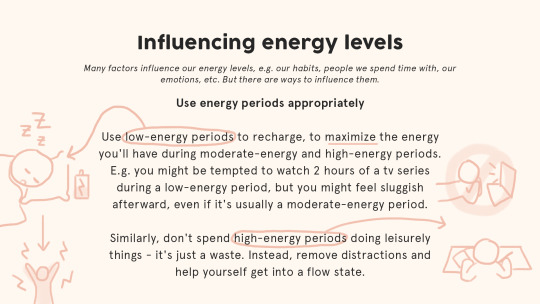
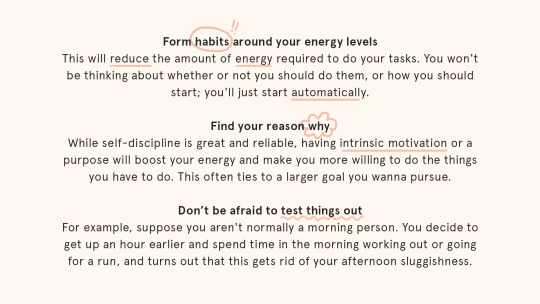
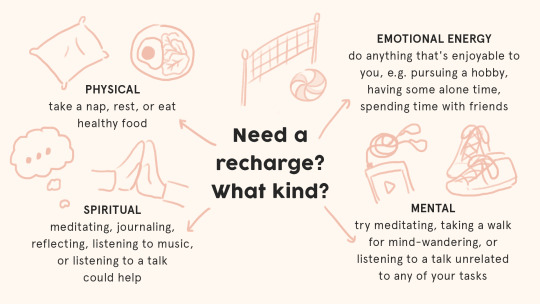
Energy Management
A human-based organization method
click on images for better resolution; images also available here (link to google drive)
Other posts that may be of interest:
Getting stuff done: How to deal with a lack of motivation
Flexible time-blocking: A more breathable way to get things done
The ABCDE Method
30K notes
·
View notes
Text
This is a big, giant list of Youtube tutorials that will teach you all the basic life skills you need to know in order to be a functional adult. There are a lot of important skills that aren’t included in this list, but this should be enough of a basic guide to get you started and prevent you from making a total mess of yourself. Happy adulting! Household Skills:
How to unclog a toilet without a plunger
How to fix a blown fuse
How to fix a leaky faucet
How to clean soap scum from your tub and shower
How to escape from a house fire
How to make a budget and stick to it
How to sharpen a knife
How to clean a self-cleaning oven
How to clean red wine stains from carpet
How to clean blood stains from fabric
How to clean grease stains from fabric
How to do a load of laundry
How to iron your clothes
How to test your smoke detectors
Cooking Skills:
How to tell if produce is ripe
How to know if food is expired
How to properly sanitize a kitchen
How to cook an egg
How to make rice
How to make pasta
How to put out a kitchen grease fire safely
How to use a gas stove
How to use a convection oven
How to cook meat safely
How to use a stand mixer
How to use kitchen knives properly
How to make mashed potatoes
How to make grilled cheese sandwiches
Health Skills:
How to stop bleeding
How to treat a burn
How to do CPR (on an adult)
How to do CPR (on a child)
How to do CPR (on a baby)
How to help someone who is choking
How to save yourself if you are choking alone
How to read a nutrition label
How to treat frostbite
How to recognize when someone is having a stroke
How to maintain a healthy sleep schedule
Mental Health Skills:
How to calm down during a panic attack
How to help someone who is suicidal
How to meditate
How to stop self-harming
How to recognize problem drinking
How to choose a therapist
How to deal with disappointment
How to cope with grief
How to raise your self-esteem
Relationship and Social Skills:
How to apologize
How to cope with a breakup
How to accept criticism
How to deal with bullying
How to argue in a healthy way
How to ask someone out
How to break up with someone
How to recognize an abusive relationship
How to rekindle a damaged friendship
How to speak in public
Job Hunting Skills:
How to tie a tie
How to write a resume
How to write a cover letter
How to dress for a job interview (for women/femmes)
How to dress for a job interview (for men/masculines)
How to properly shake hands
How to nail a job interview
Other Skills:
How to sew on a button
How to hammer a nail
How to change your oil
How to put gas in your car
How to jump-start a car
How to pick a good password
How to back up your files
How to write a cheque
200K notes
·
View notes
Text
I want to start following more college/university Studyblrs
Reblog this if you’re in college or university!
I want to get more tips as I’m graduating high school this year! Thanks!
1K notes
·
View notes
Text
my masterlist of 'how to life’ tips
Cleaning & Tidying
Make your bed in the morning. It takes seconds, and it’s worth it.
Reset to zero each morning.
Use the UFYH 20/10 system for clearing your shit.
Get a reed diffuser and stick it on your windowsill.
Have a ‘drop-zone’ box where you dump anything and everything. At the beginning/end of the day, clear it out and put that shit away.
Roll your clothes, don’t fold them - or fold them vertically.
Automate your chores. Have a cleaning schedule and assign 15mins daily to do whatever cleaning tasks are set for that day. Set a timer and do it - once the timer is up, finish the task you’re on and leave it for the day.
Fold your clothes straight out of the tumble dryer (if you use one), whilst they’re still warm. This minimises creases and eliminates the need for ironing.
Clean your footwear regularly and you’ll feel like a champ.
Organisation & Productivity
Learn from Eisenhower’s Importance/Urgency matrix.
Try out the two-minute rule and the Pomodoro technique.
Use. A. Planner. (Or Google Calendar, if that’s more your thing.)
Try bullet journalling.
Keep a notebook/journal/commonplace book to dump your brain contents in on the regular.
Set morning alarms at two-minute intervals rather than five, and stick your alarm on the other side of the room. It’s brutal, but it works.
Set three main goals each day, with one of them being your #1 priority. Don’t overload your to-do list or you’ll hit overload paralysis and procrastinate.
If you’re in a slump, however, don’t be afraid to put things like “shower” on your to do list - that may be a big enough goal in itself, and that’s okay.
Have a physical inbox - a tray, a folder, whatever. If you get a piece of paper, stick it in there and sort through it at the end of the week.
Consider utilising the GTD System, or a variation of it.
Try timeboxing.
Have a morning routine, and guard that quiet time ferociously.
Save interesting-looking shit to instapaper. Have a set time where you read through the stuff you saved to instapaper and save the shit that you like from instapaper to evernote (or bookmark it properly).
During your working hours, put on your footwear, even if you’re sat on your bed. (Why?)
Have a folder for all your important documents and letters, organised by topic (e.g. medical, bank, university, work, identification). At the front of this folder, have a sheet of paper with all the key information written on it, such as your GP’s details, your passport details, driving licence details, bank account number, insurance number(s), and so on.
Try using StayFocusd and RescueTime (or similar apps/extensions). (I promise, you’ll find that you’re not as busy as you think you are.)
Schedule working time and down time alike, in the balance that works for you.
Money
Have. A. God. Damn. Budget.
Use a money tracker like toshl, mint, or splitwise. Enter all expenses asap! (You will forget, otherwise.)
Have a ‘money date’ each week, where you sort through your finances from the past seven days and then add it to a spreadsheet. This will help you identify your spending patterns and whether your budget is actually working or not.
Pack your own frickin’ lunch like a grown-up and stop buying so many takeaway coffees. Keep snacks in your bag.
Go to your bank and take out £100 in £1 coins (or w/e your currency is). That shit will come in useful for all kinds of things and you’ll never be short on change for the bus or the laundry.
Food & Cooking
Know how to cook the basics: a starch, a protein, a vegetable, and a sauce.
Simple, one-pot meals (“a grain, a green, and a bean”) are a godsend.
Dried porcini mushrooms make a fantastic stock to cook with.
Batch cook and freeze. Make your own ‘microwave meals’.
Buy dried goods to save money - rice and beans are a pittance. (Remember to soak dried beans first, though!)
Consider Meatless Mondays; it’s healthier, cheaper, and more environmentally friendly.
Learn which fruits and vegetables are cheapest at your store, and build a standard weekly menu around those. (Also remember that frozen vegetables are cheap and healthy.)
Learn seasoning combinations. Different seasoning, even with the exact same ingredients, can make a dish seem completely new.
Don’t buy shit for a one-off recipe, especially if you won’t use it all. If you really want to try out a recipe, see if a friend would be interested in making it with you, then pool for the expenses.
Make your own goddamned pasta sauce. Jamie Oliver has a decent recipe here, but the beauty of tomato sauce is that you can totally wing it and adapt the fuck out of it.
Misc
Have a stock email-writing format.
Want to start running, but find it boring? Try Zombies, Run!.
Keep a goddamn first aid kit and learn how to use it.
Know your OTC pain relief.
Update your CV regularly.
Keep a selection of stamps and standard envelopes for unexpected posting needs. (It happens more regularly than you would think!)
Some final words of advice:
Organisation is not a goal in itself, it is a tool. Don’t get caught up in the illusion of productivity and get distracted from the actual task at hand.
Routines and habits will help you. Trust in them.
You have the potential to be an organised and productive person, just as much as anybody else. It just takes practice.
45K notes
·
View notes
Text
Tips to learn a new language
The 75 most common words make up 40% of occurrences The 200 most common words make up 50% of occurrences The 524 most common words make up 60% of occurrences The 1257 most common words make up 70% of occurrences The 2925 most common words make up 80% of occurrences The 7444 most common words make up 90% of occurrences The 13374 most common words make up 95% of occurrences The 25508 most common words make up 99% of occurrences
(Sources: 5 Steps to Speak a New Language by Hung Quang Pham)
This article has an excellent summary on how to rapidly learn a new language within 90 days.
We can begin with studying the first 600 words. Of course chucking is an effective way to memorize words readily. Here’s a list to translate into the language you desire to learn that I grabbed from here! :)
EXPRESSIONS OF POLITENESS (about 50 expressions)
‘Yes’ and ‘no’: yes, no, absolutely, no way, exactly.
Question words: when? where? how? how much? how many? why? what? who? which? whose?
Apologizing: excuse me, sorry to interrupt, well now, I’m afraid so, I’m afraid not.
Meeting and parting: good morning, good afternoon, good evening, hello, goodbye, cheers, see you later, pleased to meet you, nice to have met.
Interjections: please, thank you, don’t mention it, sorry, it’ll be done, I agree, congratulations, thank heavens, nonsense.
NOUNS (about 120 words)
Time: morning, afternoon, evening, night; Sunday, Monday, Tuesday, Wednesday, Thursday, Friday, Saturday; spring, summer, autumn, winter; time, occasion, minute, half-hour, hour, day, week, month, year.
People: family, relative, mother, father, son, daughter, sister, brother, husband, wife; colleague, friend, boyfriend, girlfriend; people, person, human being, man, woman, lady, gentleman, boy, girl, child.
Objects: address, bag, book, car, clothes, key, letter (=to post), light (=lamp), money, name, newspaper, pen, pencil, picture, suitcase, thing, ticket.
Places: place, world, country, town, street, road, school, shop, house, apartment, room, ground; Britain, name of the foreign country, British town-names, foreign town-names.
Abstract: accident, beginning, change, color, damage, fun, half, help, joke, journey, language, English, name of the foreign language, letter (of alphabet), life, love, mistake, news, page, pain, part, question, reason, sort, surprise, way (=method), weather, work.
Other: hand, foot, head, eye, mouth, voice; the left, the right; the top, the bottom, the side; air, water, sun, bread, food, paper, noise.
PREPOSITIONS (about 40 words)
General: of, to, at, for, from, in, on.
Logical: about, according-to, except, like, against, with, without, by, despite, instead of.
Space: into, out of, outside, towards, away from, behind, in front of, beside, next to, between, above, on top of, below, under, underneath, near to, a long way from, through.
Time: after, ago, before, during, since, until.
DETERMINERS (about 80 words)
Articles and numbers: a, the; nos. 0–20; nos. 30–100; nos. 200–1000; last, next, 1st–12th.
Demonstrative: this, that.
Possessive: my, your, his, her, its, our, their.
Quantifiers: all, some, no, any, many, much, more, less, a few, several, whole, a little, a lot of.
Comparators: both, neither, each, every, other, another, same, different, such.
ADJECTIVES (about 80 words)
Color: black, blue, green, red, white, yellow.
Evaluative: bad, good, terrible; important, urgent, necessary; possible, impossible; right, wrong, true.
General: big, little, small, heavy; high, low; hot, cold, warm; easy, difficult; cheap, expensive; clean, dirty; beautiful, funny (=comical), funny (=odd), usual, common (=shared), nice, pretty, wonderful; boring, interesting, dangerous, safe; short, tall, long; new, old; calm, clear, dry; fast, slow; finished, free, full, light (=not dark), open, quiet, ready, strong.
Personal: afraid, alone, angry, certain, cheerful, dead, famous, glad, happy, ill, kind, married, pleased, sorry, stupid, surprised, tired, well, worried, young.
VERBS (about 100 words)
arrive, ask, be, be able to, become, begin, believe, borrow, bring, buy, can, change, check, collect, come, continue, cry, do, drop, eat, fall, feel, find, finish, forget, give, going to, have, have to, hear, help, hold, hope, hurt (oneself), hurt (someone else), keep, know, laugh, learn, leave, lend, let (=allow), lie down, like, listen, live (=be alive), live (=reside), look (at), look for, lose, love, make, may (=permission), may (=possibility), mean, meet, must, need, obtain, open, ought to, pay, play, put, read, remember, say, see, sell, send, should, show, shut, sing, sleep, speak, stand, stay, stop, suggest, take, talk, teach, think, travel, try, understand, use, used to, wait for, walk, want, watch, will, work (=operate), work (=toil), worry, would, write.
PRONOUNS (about 40 words)
Personal: I, you, he, she, it, we, they, one; myself, yourself, himself, herself, itself, ourselves, yourselves, themselves.
Possessive: mine, yours, his, hers, its, ours, theirs.
Demonstrative: this, that.
Universal: everyone, everybody, everything, each, both, all, one, another.
Indefinite: someone, somebody, something, some, a few, a little, more, less; anyone, anybody, anything, any, either, much, many.
Negative: no-one, nobody, nothing, none, neither.
ADVERBS (about 60 words)
Place: here, there, above, over, below, in front, behind, nearby, a long way away, inside, outside, to the right, to the left, somewhere, anywhere, everywhere, nowhere, home, upstairs, downstairs.
Time: now, soon, immediately, quickly, finally, again, once, for a long time, today, generally, sometimes, always, often, before, after, early, late, never, not yet, still, already, then (=at that time), then (=next), yesterday, tomorrow, tonight.
Quantifiers: a little, about (=approximately), almost, at least, completely, very, enough, exactly, just, not, too much, more, less.
Manner: also, especially, gradually, of course, only, otherwise, perhaps, probably, quite, so, then (=therefore), too (=also), unfortunately, very much, well.
CONJUNCTIONS (about 30 words)
Coordinating: and, but, or; as, than, like.
Time & Place: when, while, before, after, since (=time), until; where.
Manner & Logic: how, why, because, since (=because), although, if; what, who, whom, whose, which, that.
240K notes
·
View notes
Text

Listen to music in that language. Listening to music in the language you are trying to learn surrounds you in the language and helps you develop a sense of how it sounds.
Watch TV and movies in that language. Listening to people have actual conversations in the language can help give you an idea of how it works. I recommend watching variety shows and children shows because the language is normally very basic. Plus, variety shows normally have certain words and phrases on the screen.
Use flash cards and take quizzes frequently. This helps you stay sharp with things you really need to know and remember. I personally don’t like flash cards, but when it comes to learning vocabulary, it can be a big help.
Practice writing and spelling. You can do this by writing daily in a journal. This can also help with forming your own sentences. Simply write about things like what you ate or what you did, or your thoughts in general. The more you write, the more comfortable you will be forming your own sentences.
Try speaking in the language whenever you get a chance. Do it with a friend who’s also learning or someone who already speaks the language. If you can’t do either one of those, you can practice by talking to yourself or an assistant on your phone. There are also apps such as hellotalk or kakao where you can talk to people. ALWAYS BE CAREFUL WHEN TALKING TO STRANGERS!!!
Learn words and phrases that you find yourself using often. Don’t try to learn advanced phrases and terms that you don’t use on an everyday basis. You may think it’s helping you, but it’s actually setting you back.
Learn more about the culture that surrounds the language. When you learn more about the culture, you will understand why certain things are said in certain situations. Understanding the culture = Understanding the language
Master the alphabet + pronunciation. Before you learn any sort of vocabulary or sentence forms, fully understanding the alphabet and each letter’s pronunciation is a MUST! In every language, there are those letters’ sounds that change depending on certain factors.
Master sentence structure. Sentence structure is a big problem that many people face when first learning a language. Chances are the sentence structure of the language you’re learning is the complete opposite from your own. (Unless you speak English and are learning Chinese; vice versa)
Become familiar with the keyboard. You will probably find yourself typing in the language often, so you might as well learn the keyboard. I recommend downloading a keyboard on your phone from the play store or app store.
Practice daily. When you do this, you’re bound to remember the information better. If you don’t and you stop studying for too long, there’s a high chance that you’ll forget some of the basics. I would know. It’s happened to me before.

GOOD LUCK
5K notes
·
View notes
Photo








Here’s some weapons for your essay writing arsenal!
Hemingway Editor Calmly Writer The Most Dangerous Writing App Purdue O.W.L. One Look Thesaurus JSTOR Google Scholar
Reply with your favourite or other great websites I didn’t include!
71K notes
·
View notes
Text
Guide #2: Striving for Discipline
“We must do our work for its own sake, not for fortune or attention or applause.” - Steven Pressfield
Motivation is fleeting, but self-discipline is lasting. It is easy to motivate oneself: A motivational quote, searching #motivation, scouring /r/getmotivated on reddit. It is easy and fades away by the next day.
Discipline on the other hand stays. It is a habit and takes time to build. But, after one builds this habit, it becomes easier to work on: that writing piece that you have always been meaning to write, that book you wanted to read but cannot seem to find the time to do so.
1. Choose a goal.
Goals, we all have those. What do you wish to accomplish in let’s say a year? Do you wish to work on your backlog of books? Perhaps, you wish to learn another language? Learn to cook? Figure out what you want as an end goal. It is not the goal that matters most, it is about getting started on something. Moving. Not staying where you are any longer.
2. Break that goal into small steps.
Goals, big ones especially are frightening. They require you to change a lot. You might feel that it is too difficult to tackle in one shot, and it most likely is. But, you will be able to work towards that goal by breaking the goal into smaller goals. Smaller tasks that you can for sure accomplish.
E.g. Big Goal / End Goal: Learning a language.
(Which part of the language you wish to focus on? Everything is a bit too vague… )
- Small tasks/goals: Learn the alphabet; Learn the basic pronunciation of those words; Gather the textbooks & study material, learn the basic words …
It might not seem like much at first. You might feel miles away from that end goal but you are learning. You are making progress. It will take some time, but you will get there if you persist.
3. Setting a time.
Habits form only after repeatedly perform the tasks a countless number of times. Your brain can more or less autopilot the task after a time span. Starting to work on any goal is difficult. You cannot seem to find the time to work on it. The task seems too difficult and you might be prone to giving up because you cannot see the change happening right away.
Starting off small. Pick a time of the day where you feel at your best. (Getting rid of difficult tasks early morning is easier than later during the day…) It is all about repetition. Figure out a time and stick to it.
** Important to note: When during the day? What will you be working on?
E.g. I want to improve my knowledge in [X] area.
- Therefore, I will dedicate 15 minutes a day in the morning to work in [X] area.
No excuses. Train your self-control to dedicate that time to work on only that one task with your complete focus. Even if it feels boring, pointless, keep let the time pass. The worst you can do is not learn anything or make progress at all. If you put in the time no matter how small it is, you are moving forward.
4. Marking those days.
Repetitions. Note down the days you work on that goal. It will help keep track of your progress and nothing feels better than getting a task done.
5. Planning.
It is important to plan ahead of time what you wish to improve on. Ideally, when you finish that goal, the night before, plan out what you wish to accomplish the following day.
Having a game plan provides clarity on your objectives. Give yourself time each week to review what exactly went right or wrong during your working time.
6. Don’t be too hard on yourself. There may be days where you feel that you do not have the energy to do nothing. It is fine. We have those days. Try your best to be consistent in improving in your art, but do not overwork yourself. Burning out takes more time to recover than actually taking a small break or day off.
Give it some time. You are making process a day at a time. As long as you are not staying stagnant, you are changing.
If you ever wish to buy me a coffee to support me, Buy Me a Coffee.
Best of Luck,
Airi
164 notes
·
View notes
Text
2018 Student Guide
With the start of 2018 well underway, I wanted to make a masterpost full of links on how to adjust your perspective with studying. Perhaps you want to become a better student overall, improve your focus or get into your dream college, there is always something we want to do better! Hopefully these tips will make 2018 your best academic year yet!
Organisation
2018 student planner
planner brand recommendations
planner vs bullet journal: pros and cons
how to set up a bullet journal
setting up a digital bullet journal
bullet journal spread ideas
bullet journal decoration hacks
bullet journal brand recommendations
whats in my bag
my favourite stationery
back to school basic supplies
how to improve your handwriting
handwriting font suggestions
balancing study and work
desk/workspace essentials
student finance tips
2018 monthly planner printables
Productivity
productivity and time management applications
how to remove distractions
types of procrastination and how to deal with them
google chrome new tab options for improved productivity
10 small ways to improve your productivity
applications to block websites
no distraction writing applications
100 days of productivity challenge
how to focus in class
how to stick to a schedule
how to stay alert
how to build self-discipline
how to organise for exams
my after school routine
how to reduce perfectionist ideas
Motivation
what to do when you’ve tried everything
how to gain back motivation
motivational monday printables
how to stop avoiding studying
what to do when you feel exhausted before studying
how I stay motivated
tips on maintaining motivation
how to start a studyblr
how to utilise your studyblr for motivation
how to set up a studygram
dealing with competitive people
how to bounce back from ‘failure’
how to learn from a lower than expected grade
how to structure a weekly review
how to deal with a difficult class
things to do during holidays/study vacations
Studying
applications for students
how to take effective class or lecture notes
how to take notes from a textbook
how to prepare for exams
my note-taking method
my notebook system
how to write faster
how to study more effectively
how to summarise information
how I organise my binders
good habits to implement
how to study (my method)
how to revise from notes
how to organise a colour code
how to memorise information effectively
how to memorise quotes
how to use flashcards
how I reduce waffle and narration in essays
tips for essay writing
how to find out where you’re going wrong
how I prepare to study
different ways to study
how to study during the semester
how to annotate a book/novel/etc
how to get ahead in school
how to break up a large textbook
studying as a visual learner
how to practice and present a speech
mindmapping apps and extensions
how to deal with online classes
how to study a language
how to study maths
how to improve group assessments/projects
Self Care
how to improve your sleep schedule
how to wake up earlier
how to study when sick
over-coming self doubt
dealing with stress
how to balance studying and anxiety
how to balance studying and depression
apps that help with depression
ways to reward your productivity
my favourite tv shows
my favourite podcasts
ways to use empty notebooks
how to be more sociable
tips for getting a job
advice for the first day
things (personal, academic, etc) to do every week
Printables
2018 monthly planner printables
2018 student printables (includes 2018 overview + calendar, daily + weekly + monthly planner, 30 habit tracker, class overview and timed worklog)
weekly study schedule
weekly planner
weekend planner
daily planner
assessment planner
subject to do list planner
study session planner
exam revision printable pack (includes revision checklist, formulas + definitions sheet, essay + project planner, weekly schedule)
note-taking printables (includes dotted, grid, lined, cornell method)
organic chemistry printable
literary techniques and devices sheet
100 days of productivity tracker printable
ultimate student organiser pack
study and revision pack
2018 student planner
2018 weekly planner
pomodoro tracker
grade and assessment planner pack
essay guide and planner pack
productivity planner
student reading journal printable
student finance planner
goal and habit planner
customisable weekly study planner
Other posts | Printables | Instagram | Youtube | Pinterest | Etsy Shop
45K notes
·
View notes
Photo

DISCLAIMER: This post is not sponsored by any company. I’ve just found some websites and information that can be used for students. Please research them thoroughly before buying/applying/signing up to anything please! If you use something that is great, please let me know so I can add it to the list!
MYUNIDAYS - Verify your student status and get discounts to lots of shops and restaurants, as well as offers and deals, including half price Apple Music student account, and 10% Asos discount. UNIDAYS can also be used in many different countries including the UK and the US. They also have an app which you can be useful when using certain discounts in shops and restaurants (some can only be used online and vice versa).
NUS - Similar to UNIDAYS, but you have to pay for an NUS card/membership. They have some pretty good discounts for various things. Again, there is an NUS app.
SAVE THE STUDENT - everything you want to know about student life, summed up in one website! Information on student finance, budgeting and saving money. Great for if you’re living at university.
STUDENT BEANS - Similar to UNIDAYS and NUS. Again, lots of discounts and you can register free. They also advertise jobs, work experience, etc.
THE STUDENT ROOM - Forums for students, which also offers lots of advice on various topics such as student finance and applying to university.
THIS IS MONEY - Some helpful student budgeting tips.
BRIGHT KNOWLEDGE - Lots of information about different subjects and careers.
SORTED FOOD - Cheap but delicious recipe ideas!
SAVE THE GRADUATE - Helpful website for graduate students, with information about jobs and further study.
BBC GOOD FOOD - More cheap recipe ideas for students.
APPLE EDUCATION - Buy Apple products using your student information.
SUPER COOK - Find recipes using what ever you have in your cupboard!
STUDENT PRICE CARD - For students in Canada, you can get discounts (10 - 15% usually) on shops, when you pay for a card/membership.
BUDGET BYTES - Delicious recipes on a budget!
This is not a complete list, but I’ll try to add to it through out the year!
8K notes
·
View notes
Text
Everything You Need To Know About MLA Format
General Format:
8.5 x 11 inch paper
Double spaced
Times New Roman font
12 pt font
Only one space after each period
1 inch margins on all sides
Indent the first line of each paragraph by half an inch
Use a header that includes your last name and page number in the top right hand corner
The First Page:
In the upper left hand corner:
Your Name
Your Instructor’s Name
The Class Title
The Date (Day Month Year)
The title of your paper should be one double-space down and should not be bolded, italicized, or underlined
The beginning of your paper should start one double-space down from the title with the first line indented by half an inch
What to Italicize and Quote:
Book titles are italicized
Play titles are italicized
Poem titles have quotation marks
Article titles have quotation marks
Chapter titles have quotation marks
In-Text Citations:
When you know the author’s last name
(Last Name Page Number) or
(Last Name Paragraph or Line Number)
When you don’t know the author’s last name
(Book Title Page Number)
(Article Title Page Number)
Remember to italicize the book titles and put the article titles in quotation marks
Works Cited Page:
Begin your Works Cited page on a separate page at the end of your research paper. It should have the same one inch margins and header as the rest of your paper
Label the page “Works Cited” (do not italicize or put in quotations) on the top of the page and center it
Double space all citations but do not skip spaces between entries
Indent the second line of a citation by half an inch
List sources in alphabetical order
If the source has more than one author, the first given name appears in last name, first name format and the following authors appear in last name, first name format separated by commas. The last author’s name should be preceded by an “and”
Citing Print Sources:
Book or Poem:
Last Name, First Name. Title of Book or Poem. City of Publication: Publisher, Year of Publication. Print.
Magazine or Newspaper Article:
Last Name, First Name. “Title of Article.” Title of Periodical Day Month Year: pages. Print.
Journal Article:
Last Name, First Name. “Title of Article.” Title of Journal Volume.Issue (Year): pages. Print.
Citing Web Sources:
Whole Website:
Name of Site. Sponsor or Publisher, date of resource creation. Web. Date of access.
Web Page or Web Article:
Last Name, First Name. “Title of Article.” Name of Site. Sponsor of Publisher, date of resource creation. Web. Date of access.
Online Journal Article:
Last Name, First Name. “Title of Article.” Title of Journal Volume.Issue (Year): pages. Web. Date of access.
Note: Don’t forget to indent the second line in the citation. I did not indent the examples because the indents on tumblr mobile and tumblr desktop differ starkly and I figured this was probably the less confusing way to write the information needed for a citation (trust me)
Unknown Information in Citations:
If the author is unknown, begin citation with the title
If the publisher is unknown, write “n.p.” in its place (no quotation marks)
If the publishing date is unknown, write “n.d.” in its place (no quotation marks)
I hope this guide is as useful for me as it it for you!
16K notes
·
View notes
Text
Regarding Hurricane Donations:
I’m going to provide some links to get you started in terms of donation resources that are available at this time for regions affected by the hurricanes that have passed through or will be coming soon. Feel free to add on.
Houston:
Coalition for the Homeless
Houston Food Bank
LGBTQ Hurricane Harvey Disaster Relief Fund (to help homeless youth, seniors, people living with HIV, hate crime survivors, and those devastated by the storm)
SHAPE- Self-Help for African People through Education (Donations will allow SHAPE to assist with medical prescriptions, make emergency cash contributions, and more)
Flood Relief for Texas Children’s Hospital
Antigua and Barbuda:
Even though the Red Cross is Questionable, Ticketing, an app developed by Antiguans, is collecting donations in-app and all funds received will be donated to the joint efforts of the National Office of Disaster Services and the Antigua and Barbuda Red Cross. Download the app on Google Play and the Apple App Store
Habitat for Humanity of Trinidad and Tobago (for Barbuda relief)
Antigua and Barbuda citizen Jessye Romeo is raising funds for Barbuda relief out of London, UK
St. Martin/St. Maarten:
St. Maarten youth living in France raise funds for relief of the island
St. Maarten Relief Fund on Youcaring
Hurricane Disaster Relief for St. Martin/ St. Maarten on Fundly
The French and Dutch Red Cross organizations are seeking donations at this time for their respective territories on then island (do research on any organization you are curious/ wary about before donating, as the Red Cross track record isn’t so hot)
Haiti:
Action Against Hunger
Oxfam
Care.org
Hope for Haiti
Dominican Republic:
Oxfam
Outreach 360
Kinship United
Puerto Rico:
Cáritas de Puerto Rico
Americares
Asociación Puertorriqueños en Marcha
US Virgin Islands:
USVI Relief Fund on Gofundme
UNICEF
Florida:
Feeding Florida
Coalition for the Homeless of Central Florida
Florida Keys Children’s Shelter
United Way of Miami-Dade
This is just a starting list. As said before, please feel free to add on.
26K notes
·
View notes
Text
Tips to learn a new language
The 75 most common words make up 40% of occurrences The 200 most common words make up 50% of occurrences The 524 most common words make up 60% of occurrences The 1257 most common words make up 70% of occurrences The 2925 most common words make up 80% of occurrences The 7444 most common words make up 90% of occurrences The 13374 most common words make up 95% of occurrences The 25508 most common words make up 99% of occurrences
(Sources: 5 Steps to Speak a New Language by Hung Quang Pham)
This article has an excellent summary on how to rapidly learn a new language within 90 days.
We can begin with studying the first 600 words. Of course chucking is an effective way to memorize words readily. Here’s a list to translate into the language you desire to learn that I grabbed from here! :)
EXPRESSIONS OF POLITENESS (about 50 expressions)
‘Yes’ and ‘no’: yes, no, absolutely, no way, exactly.
Question words: when? where? how? how much? how many? why? what? who? which? whose?
Apologizing: excuse me, sorry to interrupt, well now, I’m afraid so, I’m afraid not.
Meeting and parting: good morning, good afternoon, good evening, hello, goodbye, cheers, see you later, pleased to meet you, nice to have met.
Interjections: please, thank you, don’t mention it, sorry, it’ll be done, I agree, congratulations, thank heavens, nonsense.
NOUNS (about 120 words)
Time: morning, afternoon, evening, night; Sunday, Monday, Tuesday, Wednesday, Thursday, Friday, Saturday; spring, summer, autumn, winter; time, occasion, minute, half-hour, hour, day, week, month, year.
People: family, relative, mother, father, son, daughter, sister, brother, husband, wife; colleague, friend, boyfriend, girlfriend; people, person, human being, man, woman, lady, gentleman, boy, girl, child.
Objects: address, bag, book, car, clothes, key, letter (=to post), light (=lamp), money, name, newspaper, pen, pencil, picture, suitcase, thing, ticket.
Places: place, world, country, town, street, road, school, shop, house, apartment, room, ground; Britain, name of the foreign country, British town-names, foreign town-names.
Abstract: accident, beginning, change, color, damage, fun, half, help, joke, journey, language, English, name of the foreign language, letter (of alphabet), life, love, mistake, news, page, pain, part, question, reason, sort, surprise, way (=method), weather, work.
Other: hand, foot, head, eye, mouth, voice; the left, the right; the top, the bottom, the side; air, water, sun, bread, food, paper, noise.
PREPOSITIONS (about 40 words)
General: of, to, at, for, from, in, on.
Logical: about, according-to, except, like, against, with, without, by, despite, instead of.
Space: into, out of, outside, towards, away from, behind, in front of, beside, next to, between, above, on top of, below, under, underneath, near to, a long way from, through.
Time: after, ago, before, during, since, until.
DETERMINERS (about 80 words)
Articles and numbers: a, the; nos. 0–20; nos. 30–100; nos. 200–1000; last, next, 1st–12th.
Demonstrative: this, that.
Possessive: my, your, his, her, its, our, their.
Quantifiers: all, some, no, any, many, much, more, less, a few, several, whole, a little, a lot of.
Comparators: both, neither, each, every, other, another, same, different, such.
ADJECTIVES (about 80 words)
Color: black, blue, green, red, white, yellow.
Evaluative: bad, good, terrible; important, urgent, necessary; possible, impossible; right, wrong, true.
General: big, little, small, heavy; high, low; hot, cold, warm; easy, difficult; cheap, expensive; clean, dirty; beautiful, funny (=comical), funny (=odd), usual, common (=shared), nice, pretty, wonderful; boring, interesting, dangerous, safe; short, tall, long; new, old; calm, clear, dry; fast, slow; finished, free, full, light (=not dark), open, quiet, ready, strong.
Personal: afraid, alone, angry, certain, cheerful, dead, famous, glad, happy, ill, kind, married, pleased, sorry, stupid, surprised, tired, well, worried, young.
VERBS (about 100 words)
arrive, ask, be, be able to, become, begin, believe, borrow, bring, buy, can, change, check, collect, come, continue, cry, do, drop, eat, fall, feel, find, finish, forget, give, going to, have, have to, hear, help, hold, hope, hurt (oneself), hurt (someone else), keep, know, laugh, learn, leave, lend, let (=allow), lie down, like, listen, live (=be alive), live (=reside), look (at), look for, lose, love, make, may (=permission), may (=possibility), mean, meet, must, need, obtain, open, ought to, pay, play, put, read, remember, say, see, sell, send, should, show, shut, sing, sleep, speak, stand, stay, stop, suggest, take, talk, teach, think, travel, try, understand, use, used to, wait for, walk, want, watch, will, work (=operate), work (=toil), worry, would, write.
PRONOUNS (about 40 words)
Personal: I, you, he, she, it, we, they, one; myself, yourself, himself, herself, itself, ourselves, yourselves, themselves.
Possessive: mine, yours, his, hers, its, ours, theirs.
Demonstrative: this, that.
Universal: everyone, everybody, everything, each, both, all, one, another.
Indefinite: someone, somebody, something, some, a few, a little, more, less; anyone, anybody, anything, any, either, much, many.
Negative: no-one, nobody, nothing, none, neither.
ADVERBS (about 60 words)
Place: here, there, above, over, below, in front, behind, nearby, a long way away, inside, outside, to the right, to the left, somewhere, anywhere, everywhere, nowhere, home, upstairs, downstairs.
Time: now, soon, immediately, quickly, finally, again, once, for a long time, today, generally, sometimes, always, often, before, after, early, late, never, not yet, still, already, then (=at that time), then (=next), yesterday, tomorrow, tonight.
Quantifiers: a little, about (=approximately), almost, at least, completely, very, enough, exactly, just, not, too much, more, less.
Manner: also, especially, gradually, of course, only, otherwise, perhaps, probably, quite, so, then (=therefore), too (=also), unfortunately, very much, well.
CONJUNCTIONS (about 30 words)
Coordinating: and, but, or; as, than, like.
Time & Place: when, while, before, after, since (=time), until; where.
Manner & Logic: how, why, because, since (=because), although, if; what, who, whom, whose, which, that.
240K notes
·
View notes
Text
How to Handle Having TOO MUCH To Do
So let’s say you’re in the same boat I am (this is a running theme, have you noticed?) and you’ve just got, like, SO MUCH STUFF that HAS to get done YESTERDAY or you will DIE (or fail/get fired/mope). Everything needs to be done yesterday, you’re sick, and for whatever reason you are focusing on the least important stuff first. What to do!
Take a deep breath, because this is a boot camp in prioritization.
Make a 3 by 4 grid. Make it pretty big. The line above your top row goes like this: Due YESTERDAY - due TOMORROW - due LATER. Along the side, write: Takes 5 min - Takes 30 min - Takes hours - Takes DAYS.
Divide ALL your tasks into one of these squares, based on how much work you still have to do. A thank you note for a present you received two weeks ago? That takes 5 minutes and was due YESTERDAY. Put it in that square. A five page paper that’s due tomorrow? That takes an hour/hours, place it appropriately. Tomorrow’s speech you just need to rehearse? Half an hour, due TOMORROW. Do the same for ALL of your tasks
Your priority goes like this:
5 minutes due YESTERDAY
5 minutes due TOMORROW
Half-hour due YESTERDAY
Half-hour due TOMORROW
Hours due YESTERDAY
Hours due TOMORROW
5 minutes due LATER
Half-hour due LATER
Hours due LATER
DAYS due YESTERDAY
DAYS due TOMORROW
DAYS due LATER
At this point you just go down the list in each section. If something feels especially urgent, for whatever reason - a certain professor is hounding you, you’re especially worried about that speech, whatever - you can bump that up to the top of the entire list. However, going through the list like this is what I find most efficient.
Some people do like to save the 5 minute tasks for kind of a break between longer-running tasks. If that’s what you want to try, go for it! You’re the one studying here.
So that’s how to prioritize. Now, how to actually do shit? That’s where the 20/10 method comes in. It’s simple: do stuff like a stuff-doing FIEND for 20 minutes, then take a ten minute break and do whatever you want. Repeat ad infinitum. It’s how I’ve gotten through my to do list, concussed and everything.
You’ve got this. Get a drink and start - we can do our stuff together!
100K notes
·
View notes
Text
Important TED talks
Summer is time to relax but we should take the time to think. Here are my favorites ted talk videos that I think everyone should watch:
The virginity fraud - Nina Dølvik Brochmann and Ellen Støkken Dahl
This is what it’s like to go undercover in North Korea - Suki Kim
My escape from North Korea - Hyeonseo Lee
The Muslim on the airplane - Amal Kassir
The Secret of Becoming Mentally Strong - Amy Morin
The skill of self confidence - Dr. Ivan Joseph
How to stop screwing yourself over - Mel Robbins
The Magic of Not Giving a F*** - Sarah Knight
Why the universe seems so strange - Richard Dawkins
The pattern behind self-deception - Michael Shermer
Militant atheism - Richard Dawkins
Why domestic violence victims don’t leave - Leslie Morgan Steiner
Lessons from death row inmates - David R. Dow
Lessons from the Mental Hospital - Glennon Doyle Melton
Why we choose suicide - Mark Henick
What’s Wrong with Dying? - Lesley Hazleton
I’m Taking My Body Back - Rupi Kaur
My philosophy for a happy life - Sam Berns
The surprising habits of original thinkers - Adam Grant
The surprising secret to speaking with confidence - Caroline Goyder
Want to sound like a leader? Start by saying your name right - Laura Sicola
Programming your mind for success - Carrie Green
All it takes is 10 mindful minutes - Andy Puddicombe
63K notes
·
View notes